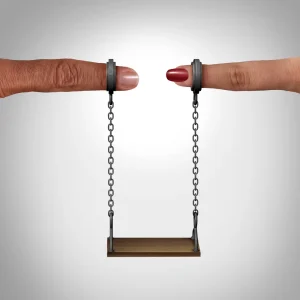It is, sadly, common for divorced spouses or parents to argue and fight. But what is not normal is violence or abuse. Sadly, the tempers, emotion, and frustration of a broken family situation or a full divorce often end in one party threatening or actually hurting the other–or even a child. When this happens, the abused party may want to seriously think about asking the Court to enter a domestic violence restraining order or injunction.
What is Domestic Violence?

Florida has a very broad definition of domestic violence, which covers almost every form of abuse against both adults and children.
It can include threats of bodily harm (assault) and battery. It can also include sexual assault or battery. That can include non-touching types of sexual assault, such as exposure of a child to indecency.
Physical restraining of people, such as kidnapping or false imprisonment, is also defined as domestic violence. Stalking is also prohibited. And if there is a physical injury, then any crime that causes that injury will justify a finding of domestic violence.
Anytime someone has a reasonable belief that they are in imminent danger, even if there is no physical violence, a restraining order can be entered.
What is “Domestic”?
Domestic violence is not just between people who live together. It also includes unmarried people, parents who may not live together, parents who used to live together, non-spouse families, same-sex partners, or others who have some domestic or familial relationship or who at one time had such a relationship.
Getting Restraining Orders
Of course, events that constitute domestic violence are also often crimes. But even if the criminal system does not press charges or do anything, those who are victims of domestic violence can still apply for a restraining order or injunction.
To get an injunction preventing an abusive partner or person from getting close to someone else, the victim must fill out a petition for an injunction for protection. That petition must allege solid, tangible facts to support the injunction.
In some cases, after review of the petition, the injunction can be entered the same day, for a short period of time (usually 15 days), until a full hearing can be held on the matter, with the attendance of all parties involved. Parties who are notified that an injunction has been entered against them should not ignore the injunction; they will need to find representation for the full hearing to either limit or completely dissolve the temporary injunction that has been put in place.
Minor Children and Custody
If there are minor children involved (either as victims or just children of the parties), the judge will make an on-the-spot, temporary decision as to child custody, visitation, and child support.
If one parent has an injunction entered against them, it doesn’t mean that they will have no contact with the children (although that is possible in very severe cases), but that parent will likely not get the same visitation as the other (victim) parent.
Sometimes, domestic violence situations are very “he said/she said,” and the judge will enter the restraining order just to keep the parties separated without knowing which parent is “at fault.” Because domestic violence hearings are often held as soon as possible, they are often not the same as full-blown trials. In that case, the court can still order an about equal time-sharing schedule with the kids.
In more serious cases, a court may order an abusive parent or spouse to have visitation with the child only under professional supervision.
Modification
There are situations where a party can ask to have a restraining order modified. Even if both parties want and ask for the modification, that does not mean the court will grant it. The court is not bound to do what the parties want, but rather, is bound to protect the child and the person that was, in the past, abused.
Parental Contact
If the court finds that there is domestic violence or abuse but that the abuse does not affect or endanger the children, the judge may put into place protocols that just limit contact between the parents.
Most of the time, when a domestic violence injunction is entered, the order will say how the parties are to account for the absolutely necessary types of communication that relate to the children. That may include using third parties, apps, a parenting coordinator, or limiting communication to text messages.
Exchanges of custody on a regular basis may have to be in public places, at different times, to avoid the restrained and unrestrained parents from getting too close and violating the injunction. Or the court may order that one parent pay for a ride-sharing service to transport the kids between parents.
Duty to Report
Many parents fear what will happen if they report a spouse or parent for committing domestic violence—that is, they may be concerned that a child will “lose their dad” or “not see their mom,” However, a parent who doesn’t report domestic violence, especially violence or abuse against a child, can lose custody of their child as well, not to mention, they may be subject to other criminal charges for the failure to report abuse.
False Accusations
It does happen that parents or spouses will use restraining orders as weapons to “get back” at the other parent or to seemingly get a leg up in a disputed child custody case. But that is a bad idea; a parent who is found to have falsified information in connection with a restraining order can have their time-sharing schedule with minor children severely limited by the family court judge.
When Custody Has Already Been Established
Sometimes, domestic violence injunctions are entered when there is already a time-sharing or custody order in place—for example, long after the parties have divorced or had a time-sharing schedule finalized by a judge.
The injunction, if serious enough, allows the domestic violence judge to modify any pre-existing court judgment that establishes child custody.
However, you may need to go back to the family court judge for a permanent modification order if you feel that the domestic violence injunction is serious enough to warrant a permanent change in custody and time-sharing. Otherwise, when and if the restraining order expires or is dissolved, your normal pre-existing custody schedule will come back into effect.
Domestic violence can be scary and dangerous. But do not ignore it or try to go it alone.
Anthony J. Diaz is an experienced family law attorney focusing on Mediation and Collaborative Divorce. His offices are located at 2431 Aloma Ave Suite #124,
Winter Park, FL 32792 and 3720 Suntree Blvd., Suite 103G, Melbourne, FL. 32940.
You may contact Anthony Diaz by calling 407-212-7807 or by email an*****@************aw.com or visit anthonydiazlaw.com for more information.
If you find this article helpful, please leave us a review HERE.





